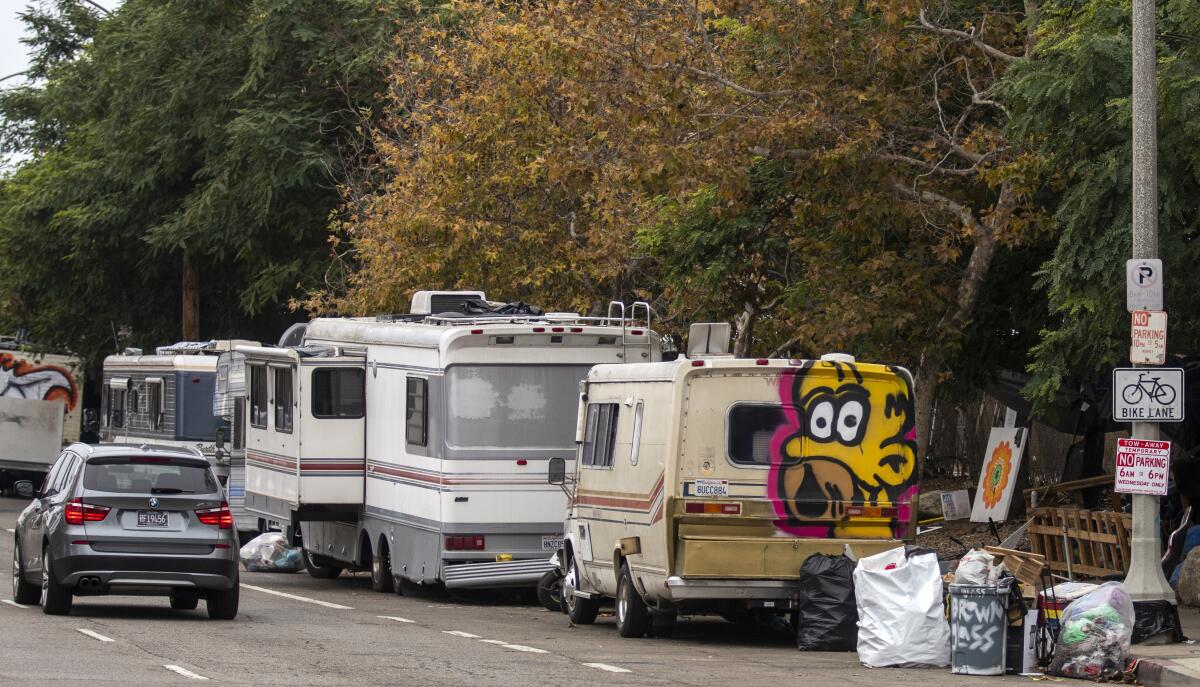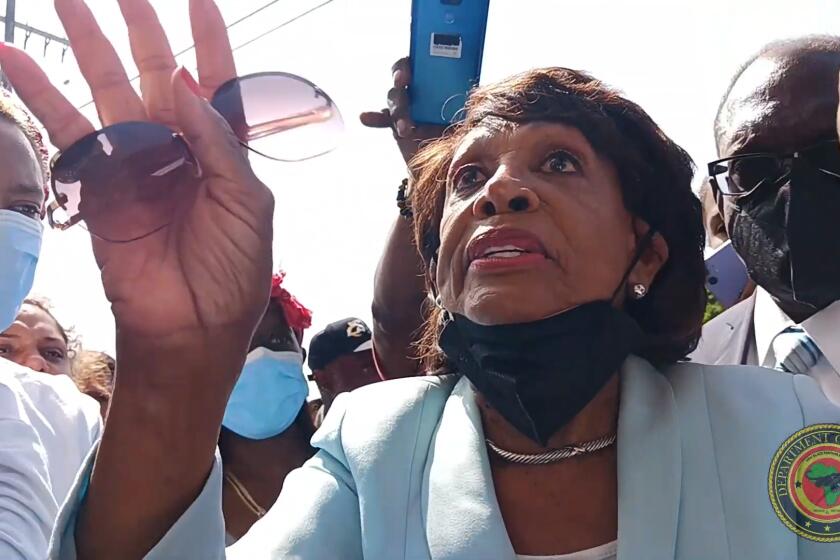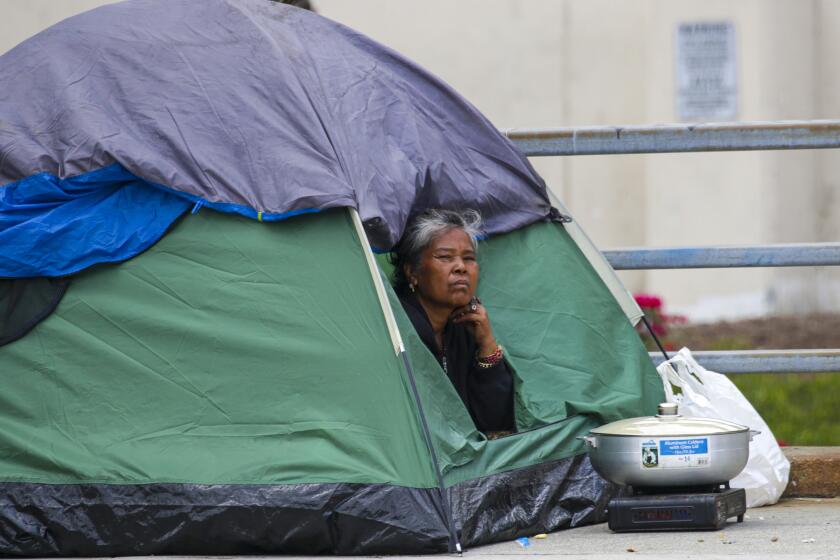Los Angeles lifts moratorium on towing RVs, pledges to move problem campers

- Share via
Hundreds of people living in recreational vehicles parked on Los Angeles streets have largely avoided towing thanks to a pandemic-era moratorium on impounding oversized vehicles used as homes.
But on Wednesday, the Los Angeles City Council voted to lift the moratorium amid growing complaints from residents who say some RV dwellers dump human waste on streets, use drugs and accumulate trash.
City officials say they will begin to enforce the regulation next month, prioritizing RVs and campers that are unregistered, inoperable or heavily damaged, as well as ones that interfere with construction, pose a safety hazard by blocking driveways or traffic or have had multiple responses from the Department of Sanitation. Officials will also resume towing cars that violate posted parking restrictions.
“Neighborhoods have been inundated with RVs, campers and trucks,” said Councilman Joe Buscaino, who pushed for enforcement. On Wednesday he displayed images of a burning RV and another surrounded by trash.
“Residents across the city have contacted my office pleading for help addressing nuisance conditions associated with RVs,” he said, “including narcotic sales, fights, loud music, verbal physical threats, intimidation, dumping of wastewater in the street, blocked sightlines, suspected sex trafficking, hoarding, accumulation of trash and large pieces of furniture.”
Hundreds of people line up in South L.A. after an erroneous rumor of housing vouchers, putting an emotional Rep. Maxine Waters on the defensive.
The proliferation of the large campers has mirrored the rise of homelessness across the region and brought the issue into neighborhoods previously less affected by it. But removing people from encampments has proved challenging, as tensions flare between homeless communities that want to stay put and the city trying to deal with often filthy or unsafe conditions.
A ban on overnight parking still might face challenges in federal court. Last year, in a lawsuit filed on behalf of a class represented by a female RV dweller in Venice, U.S. District Judge David O. Carter declined to issue a preliminary injunction against the law — as long as the moratorium was in place.
Stephen Yagman, the civil rights attorney who filed the suit, said he would “instantly be back in court in front of Judge Carter” and late Wednesday afternoon filed an application for a temporary restraining order to stop enforcement of the law.
For those on the streets, RVs can be a respite with their small bathrooms, kitchenettes and places to rest. They are made to be lived in and often cheaper than motels and provide some permanency.
In January 2021, Los Angeles Department of Transportation General Manager Seleta J. Reynolds wrote in a memo that the agency “will not impound or tow a vehicle that is occupied” and that, even when an occupant is not present, parking enforcement officers must “make a dwelling assessment” to determine if it is being used as living quarters.
Under the guidelines adopted Wednesday, traffic officers will be required to document that nobody is living in the vehicles set to be towed. If somebody resides in a camper, the individual will be asked to move or comply with parking restrictions. For those unwilling to, Los Angles parking officers will notify the Unified Homelessness Response Center and the Los Angeles Homeless Services Authority to offer services.
The settlement is aimed at ending a long-standing legal battle around homelessness in the city of Los Angeles.
“There will be scenarios in which dangerous vehicles must be removed. Period,” said Councilwoman Monica Rodriguez, who brought the issue to the council last year.
One potential complication is the dearth of towing services. The Los Angeles Police Department handles towing for the city, and there is only one tow company capable of removing large campers. That company has a limited space to store the vehicles.
On Slauson Avenue in South Los Angeles on Wednesday, four RVs and three unattached trailers were parked along a block of small homes.
Teo Mejia was fixing a bicycle tire outside his white RV, which was covered with a black tarp. He said he had been living on the streets for six years and city officials have come by offering various forms of housing — only to never return. The most recent visit was two years ago, he said. So when he learned about the city’s effort to store recreational vehicles like his if they find him housing, he gave a smirk.
“I would take any housing,” he said. “But they’ve promised that before and nothing came of it.
“We want action not promises.”
Tomas Arroyo, 61, who lives in a tent around the corner, chimed in: “The promise of housing is nothing but an illusion to us here.”
The men said they doubted the city could provide any long-term housing and figured that even temporary housing would be short-lived. Mejia feared he’d end up back on the streets, with his RV stuck in an impound lot.
“I’ll lose my camper,” Mejia said. “I can’t have that.”
He said that if the city approaches him, he will relocate rather than take their word on housing.
Gustavo Tabares, 47, a homeowner in the area, said he’s complained to the city about the homeless people in the street. He said he’s seen drug use and there have been shootings. He pointed to a nearby elementary school across the street.
“There’s kids around here,” he said.
The camp has also turned into an illegal dump. A boat filled with trash sits on a trailer by the RVs, and other items have been tossed next to it.
As Tabares spoke, a police cruiser drove by the encampment.
“See, they don’t do anything about it,” Tabares said. “I don’t have a problem with the people themselves. If they need help, get them help.”
Others praised the council for recognizing the RV situation had gotten out of hand.
Along Jefferson Boulevard, people living in some 60 RVs are contaminating the Ballona Wetlands ecological reserve, said Lucy Han, president of the nonprofit Friends of the Jungle.
“We are stoked this was approved,” she said. “There was so much degradation to the wetlands, the sewage from the septic tanks went into the wetlands, where there are endangered birds, wildlife and plants. There were needles that made it unsafe. There have been shootings where we couldn’t even go out there anymore.”
Los Angeles City Councilwoman Nithya Raman was the sole dissenting vote. Council members Mike Bonin, Gil Cedillo and John Lee were absent.
More to Read
Sign up for Essential California
The most important California stories and recommendations in your inbox every morning.
You may occasionally receive promotional content from the Los Angeles Times.

















